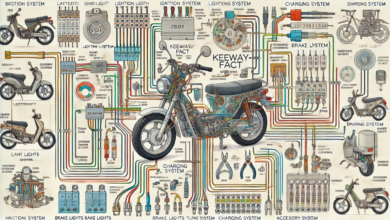What is a Performance Chip? Beginner-Friendly Guide to Unlocking Your Car’s Potential

For many of us, driving isn’t just about getting from one place to another, is it? It’s also about the experience. The way a car feels when you accelerate. The sound the engine makes as you push it. The feeling of assurance when overtaking on the open road or tackling a winding road at speed.
But here’s something that might surprise you: most cars on the road aren’t really performing at their peak. Manufacturers build them with a reserve of power, almost like a hidden potential, waiting for someone to unlock it. Think of a sports sedan gracefully maneuvering a mountain curve, its wheels blurred with speed. Imagine a digital aura emanating from under the hood. That image captures what many car lovers understand: with the right technology, you can unleash your car’s inner capabilities.
One very popular way to achieve this is by using performance chips.
So, What Exactly Are Performance Chips?
A performance chip – sometimes called an ECU tuner, tuning chip, or even an OBD2 performance tuner – is basically a little device you plug into your car’s OBD2 port. You’ll usually find that port located under the dashboard.
Consider your car’s ECU (Engine Control Unit) as its central computer, its brain if you will. It manages crucial things like:
The amount of fuel injected into the engine.
- The correct ratio of air to fuel.
- When the spark plugs fire.
- How quickly the throttle responds.
- The pressure of the turbo boost (if your car has one).
When cars leave the factory, the ECU settings are generally quite conservative. Car makers need to ensure their vehicles can operate safely across the globe, with varying fuel qualities, different climates, and strict emissions standards. Therefore, your car might not be delivering all the power it potentially could.
A performance chip intervenes and subtly adjusts these settings in real-time. It doesn’t permanently alter your ECU (like a full remap). Instead, it delicately fine-tunes various parameters, usually resulting in increased horsepower, improved throttle response, and possibly even better fuel economy.
Why Do Car Manufacturers Limit Power?
Car companies need to consider a lot more than just performance:
- Meeting emissions regulations in multiple countries.
- Handling variations in fuel quality worldwide.
- Ensuring long-term durability and reliability, even if maintenance is skipped.
- Designing for “average” use across millions of drivers.
For enthusiasts, this means untapped potential. And performance tuning chips are one of the safest and simplest ways to reclaim some of it.
What Benefits Can You Expect from a car tuner?
Drivers who install a performance chip often notice improvements right away. Here are the most common:
1. Increased Horsepower and Torque
The main attraction. Depending on your engine, a performance chip might unlock +10–40 horsepower and a healthy increase in torque.
- Naturally aspirated engines: Smoother acceleration, stronger mid-range.
- Turbocharged engines: Bigger gains, thanks to optimized boost and ignition timing.
2. Improved Throttle Response
That little delay when you hit the gas? That’s throttle lag. A tuning chip reduces or removes it, giving you instant feedback and making your car feel more alive
3. Better Fuel Economy
Surprisingly, some chips double as fuel saver chips. With an “Eco” mode, they optimize combustion and delivery, often yielding 5–10% MPG improvement during highway driving.
4. Turbo Optimization
If you own a turbocharged car, an Acura turbo performance chip (or similar brand-specific tuner) can fine-tune spool-up speed, boost pressure, and low-end torque, giving safer, stronger performance.
5. Selectable Driving Modes
Many modern chips come with built-in modes:
- Eco for efficiency.
- Sport for sharper throttle.
- Race for all-out performance.
This flexibility lets your car adapt to your driving mood.
6. Plug-and-Play Installation
Most OBD2 performance tuners are plug-and-play. No wiring. No permanent changes. And if you want to go back to stock? Just unplug it.
Performance Chips vs Other Tuning Options
- Performance Chips / OBD2 Tuners
Affordable, easy to install, reversible, and safe. - ECU Remapping
A permanent rewrite of your ECU software. Strong gains but harder to undo and may void warranty. - Piggyback Units
Advanced units wired into your ECU harness. More precise but costly and require professional installation.
For most drivers, chip tuning strikes the best balance of power, cost, and convenience.
Real-World Examples
- Sedans: A 2.4L sedan may gain +15hp, smoother throttle, and +5% highway MPG.
- SUVs/Trucks: Often see +20–30 lb-ft torque, better towing power, and slight MPG gains.
- Sports Cars: +20–40hp and sharper throttle transform the driving experience.
Owners frequently describe their cars as feeling more “alive” and more responsive.
Are Performance Chips Safe?
Yes — provided you choose a reputable product. Quality chips don’t push engines beyond safe limits. They optimize signals in real-time and remain completely reversible.
Always check:
- Compatibility (model/year/engine).
- Features (modes, app control, monitoring).
- Reputation (trusted brands, positive reviews, warranty, and support).
Final Thoughts
Picture that sports sedan on a winding highway at golden hour. Wheels blurred. A glowing aura around the engine, symbolizing hidden power. That’s what a performance chip represents: unleashing the energy, responsiveness, and efficiency your car already has inside.
So, do performance chips work? Yes — when chosen wisely. They can deliver:
- More horsepower and torque.
- Snappier throttle response.
- Improved MPG.
- Optimized turbo performance.
- Safe, reversible upgrades.
In short: if you want to unlock your car’s hidden potential, a performance chip might just be the smartest upgrade you’ll ever make.




